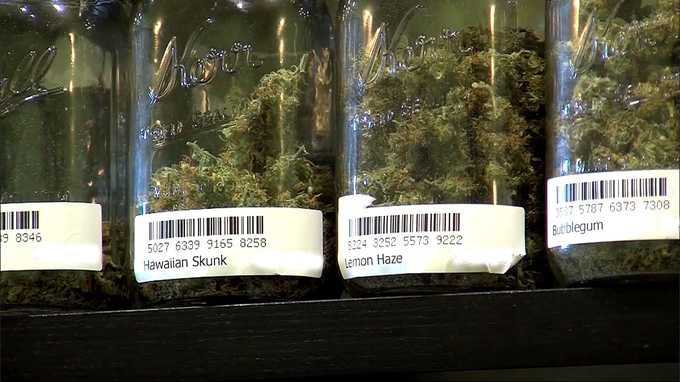

Mississippi’s new medical marijuana program is ramping up. There is a list of diseases and ailments for patients looking for relief from chronic pain and to help them cope. “Pretty much, it’s been the anguish of being in the hospital,” said sickle cell anemia patient Monica Bass. Bass hopes Mississippi’s new medical marijuana program could soon bring her relief from the pain of sickle cell anemia, which she has battled for decades.”I feel really strongly that the cannabis will definitely work to subside all of the pains that I have,” Bass said.But there could be financial side effects. Under federal law, marijuana is still classified as illegal. That’s why Medicaid and Medicare won’t cover the cost of medical cannabis. Private insurance companies are likely to do the same.”Cannabis is typically a cash-only business across the country in states where it’s both recreational and where’s it’s medical only, it’s cash-only,” said state Rep. Lee Yancey, a Republican from Rankin County.”No insurance will be paying for medical cannabis, period. It will be straight out of a patient’s pocket,” said Angie Calhoun, CEO and founder of the Mississippi Cannabis Patients Alliance. “Research shows that typically, in a new medical market, that we will be looking at approximately anywhere between $275 and $300 an ounce and that’s a lot of money.”That could be at least $900 for the maximum 3 ounces allowed per month for patients like Bass.”For me, personally, that would be something that I would just definitely budget for. I think that other things that would have to be cut out,” Bass said.Yancey said the law does give some patients a break.”Those who are disabled veterans, or disabled first-responders, that their card fee would be waived. Those who are on Medicaid would have a reduced fee,” Yancey said.Calhoun is afraid others who can’t afford to pay out-of-pocket could turn to the streets to get marijuana illegally.”We had someone who died because their cannabis was laced with fentanyl,” Calhoun said. “It’s not tested. We don’t know what’s in it. We should never put sick people in the predicament of having to go back to the illicit market.”Calhoun is looking for an alternative to reduce costs. One way to make that happen is through a research program for cannabis patients.”We’re looking forward to working with a major university and a national app company who would be able to help us with this. The more those patients give in to that app, the bigger their discount can be,” Calhoun said.The application fee for Medicaid patients will be reduced from $25 to $15.
Mississippi’s new medical marijuana program is ramping up. There is a list of diseases and ailments for patients looking for relief from chronic pain and to help them cope.
“Pretty much, it’s been the anguish of being in the hospital,” said sickle cell anemia patient Monica Bass.
Advertisement
Bass hopes Mississippi’s new medical marijuana program could soon bring her relief from the pain of sickle cell anemia, which she has battled for decades.
“I feel really strongly that the cannabis will definitely work to subside all of the pains that I have,” Bass said.
But there could be financial side effects. Under federal law, marijuana is still classified as illegal. That’s why Medicaid and Medicare won’t cover the cost of medical cannabis. Private insurance companies are likely to do the same.
“Cannabis is typically a cash-only business across the country in states where it’s both recreational and where’s it’s medical only, it’s cash-only,” said state Rep. Lee Yancey, a Republican from Rankin County.
“No insurance will be paying for medical cannabis, period. It will be straight out of a patient’s pocket,” said Angie Calhoun, CEO and founder of the Mississippi Cannabis Patients Alliance. “Research shows that typically, in a new medical market, that we will be looking at approximately anywhere between $275 and $300 an ounce and that’s a lot of money.”
That could be at least $900 for the maximum 3 ounces allowed per month for patients like Bass.
“For me, personally, that would be something that I would just definitely budget for. I think that other things that would have to be cut out,” Bass said.
Yancey said the law does give some patients a break.
“Those who are disabled veterans, or disabled first-responders, that their card fee would be waived. Those who are on Medicaid would have a reduced fee,” Yancey said.
Calhoun is afraid others who can’t afford to pay out-of-pocket could turn to the streets to get marijuana illegally.
“We had someone who died because their cannabis was laced with fentanyl,” Calhoun said. “It’s not tested. We don’t know what’s in it. We should never put sick people in the predicament of having to go back to the illicit market.”
Calhoun is looking for an alternative to reduce costs. One way to make that happen is through a research program for cannabis patients.
“We’re looking forward to working with a major university and a national app company who would be able to help us with this. The more those patients give in to that app, the bigger their discount can be,” Calhoun said.
The application fee for Medicaid patients will be reduced from $25 to $15.

